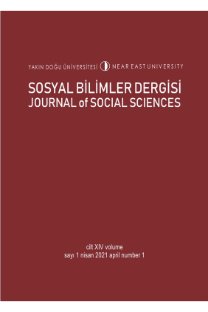Oedipus at Colonus as a divine comedy
“Oedipus at Colonus” Sophocles’in M.Ö.406’da ölümünden kısa bir süre önce yazdığı son eseridir. Oyunda, Sophocles bir zamanlar ideal Atinalı zekâsını ve cesaretini temsil eden “Oedipus” karakterine geri döner. Oyun derinlemesine incelendiğinde bu oyunun ilahi komedya kategorisi içinde olduğu anlaşılacaktır. İlahi komedya daha geniş bir alanın alt kategorisi olarak ele alınabilir ve bu incelediğimiz eser kendine has özellikleri olan farklı bir eserdir. Beşinci yüzyılın ikinci yarısındaki karmaşık kültürel ortam Oedipus’u çevreleyen ahlaki evreni oluşturur. Dönemin karmaşası tanrılar tarafından ona dayatılan Oedipus’un kötü kaderinde yansıtılır. Oyunun ana teması Oedipus’un tanrısal bir figür ve kahraman olmasını sağlayan ruhsal dönüşümü üzerine odaklanır. Kirlenmiş, kör ve fukara Oedipus insandan öte, adeta tanrısal bir varlığa dönüşür. Kutsal güç Oedipus’u sonunda dönüşeceği şeye hazırlamak için devreye girer. İlahi komik bir kahraman olarak Oedipus çile çekme ve zorluklara katlanma yeteneğine sahiptir. Zorluklar karşısındaki direnci onu onurlandırarak adını kahramanlar arasına yazdırır. Uyum ve düzen Oedipus’a uzun süreli çile çekme süreci sonunda gelir çünkü tanrılar böyle buyururlar ve Oedipus da onların buyruğunu kabul eder. Oyun tanrılar ve Oedipus arasındaki görkemli bir uzlaşıyla sona erer.
Sophocles’ Oedipus at Colonus was the last play written just before the playwright’s death in 406 B.C. In the play, Sophocles turns back to the figure of Oedipus whom he had once portrayed as the ideal type of Athenian intelligence and daring. In a deeply made analysis of Oedipus at Colonus it is clear that the play fits into the category of divine comedies. The term divine comedy can be considered as a subcategory of a larger genre, and this particular play is a kind of different writing which has its own characteristics. The anarchic cultural milieu of the latter half of the fifth century comprises the moral universe that surrounds Oedipus. The anarchy of the age is mirrored in the unwanted fate of Oedipus that the gods arbitrarily impose upon him. The main theme of the play focuses on the spiritual transformation of Oedipus into a godlike figure and a hero. The polluted, blind and poverty-stricken Oedipus is transformed into something more than man, something godlike. The divine power operates to prepare Oedipus for what he will become. As a divine comic hero, Oedipus has the ability to suffer and endure the adversities. His endurance in adversity makes Oedipus an honorable man and ultimately leads him to heroism. Harmony and order come to Oedipus at the end of his long period time of sufferings, because the gods will it and Oedipus accepts their will. The play ends in a sublime reconciliation between Oedipus and the gods.
___
August, Eugene R. "The Only Happy Ending: Divine Comedies in Western Literature" The Bulletin of the Midwest Modern Language Association, Vol. 14, No. 1 (Spring, 1981), pp. 85-99Bowra, C. M. Sophoclean Tragedy. Oxford: Oxford University Press, 1944.
Forrer, Richard. "Oedipus at Colonus: A Crisis in the Greek Notion of Deity." Comparative Drama 4th ser. 8 (1974): 328-46.
Knox, Bernard M. W. The Heroic Temper: Studies in Sophoclean Tragedy. 35 vols. Sather Classical Lectures. California: University of California Press, 1964.
Letters, F. J. H. The Life and Work of Sophocles. London: Sheed and Ward Ltd., 1953.
Sophocles. The Three Theban Plays. Trans. Robert Fagles. New York: Penguin, 1982.
Sophocles. The Complete Plays of Sophocles. Trans. Sir Richard Claverhouse Jebb. Ed. Moses Hadas. New York: Bantam Books, 1967.
Whitman, Cedric H. Sophocles: A Study of Heroic Humanism. 2nd ed. Massachusetts: Harvard University Press, 1966.
- ISSN: 1986-1303
- Yayın Aralığı: Yılda 2 Sayı
- Başlangıç: 2008
- Yayıncı: Yakın Doğu Üniversitesi
Sayıdaki Diğer Makaleler
Oedipus at Colonus as a divine comedy
The İslamist challenge in Egypt
A pioneer in Ottoman sociology: Prince Sabahattin
OECD ülkeleri vergi sistemi esnekliğinin panel eşbütünleşme testleri ile analizi
C. Erdem HEPAKTAN, SERKAN ÇINAR
Kıbrıslı Türk siyasal seçkinlerin demografik profilleri
Asiatic mode of production and the Ottoman Empire
Manuel Catells'i yeniden okumak: Küresel ağ hareketleri yaklaşımının eleştirel bir değerlendirmesi
Birinci sınıf mülki adare amirliği düzenlemesi üzerine eleştirel bir değerlendirme
